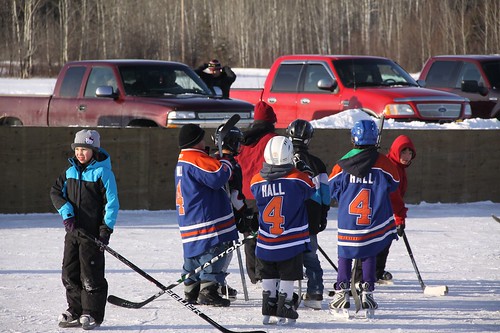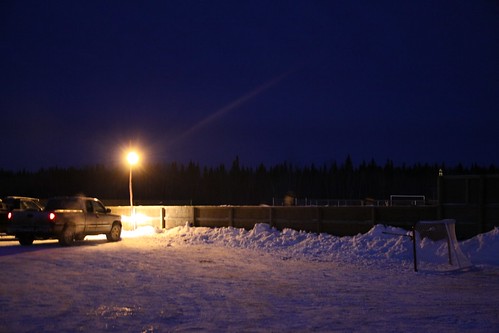This weekend I joined a group from the Alberta Federation of Labour on a trip to visit the northern Alberta community of Lubicon Lake Cree First Nation at Little Buffalo Lake. The purpose of the visit was to attend the grand opening of a new school hockey rink that the AFL and its affiliates, some regional businesses, and human rights advocates had funded.

Like many small rural communities, the recreational options of the young people in the Lubicon Cree community were limited. As we approached the hockey rink on Sunday, we immediately saw with our own eyes the level at which the new hockey rink had been embraced. Imagine a hockey game with fifty or more players on the ice. It was organized chaos. It was absolute fun.
Over the years I have heard about and read the odd article about the Lubicon Cree, but until this weekend I did not have any idea of what their community looked like or the circumstances that have prevented them from achieving Treaty rights over their traditional lands (and I admit to still not completely understanding the intricacies of the situation). In the early 1900s, the Lubicon Cree were among a number of First Nations communities located between the Athabasca River and Peace River which were overlooked by the federal Indian Agents acquiring Treaty signatories. Since that time, the Lubicon and the federal government have failed to successfully complete Treaty negotiations. Because the Lubicon are not signatories to any Treaty, they do not have any rights and do not collect royalties on the rich oil and gas deposits sitting under their traditional land (their community is not a Reservation, but a Hamlet located in Northern Sunrise County).

The lack of Treaty has taken a toll on the quality of life of the Lubicon Cree. I find it amazing that in a rich province like Alberta, we still have impoverished communities like Little Buffalo Lake, which lack the most basis amenities that most Canadians take for granted: running water.
At the moment, there is no running water system or water wells in the community. Clean water is trucked in to the community from Peace River (sometimes infrequently).
The current political situation inside the Lubicon Band presents its own challenges. Speaking with a number of community members yesterday, I was told of a bizarre story of long-time Chief Bernard Ominayak declaring himself Chief-for-Life (which is not allowed). After he delayed the 2009 Council elections, I am told that members of the Lubicon decided to hold the elections on their own in accordance with Department of Indian Affairs and Northern Development guidelines.
The vote resulted in the election of new Chief, Steve Noskey. Unfortunately, with accusations of financial irregularities being leveled by some community members against the ousted Chief, the federal government classified the leadership change as an internal leadership dispute and appointed an interim administrator to take responsibility for the housing and tuition funding provided by the federal government (you can read a background of the situation here).
Not immune from controversy of his own, readers may remember Mr. Noskey from his other role as the Chair of Board of Trustees of the Northlands School Division, which was fired by Education Minister Dave Hancock last year.
As most things in politics, I am sure that the truth lies somewhere in the middle of these stories. I am sympathetic to the Lubicon Cree in this situation, because I find it difficult to believe that the appointment of an outside administrator will make life better for the Lubicon. Ottawa does not exactly have a stellar record of making life better for Canada’s First Nations people.

Back in Edmonton, I live in a downtown condo where my biggest inconvenience is the two days a year when the running water is shut off for maintenance. Instead of feeling guilty about my quality of life, I feel optimistic that, despite complex problems facing us on the streets of our own city and in communities like Little Buffalo Lake, we can work together to build a better future for Canada. As I do my small part in helping build this better future, I will not forget what I saw at the Lubicon Cree First Nation this weekend.

12 replies on “in wealthy alberta, the lubicon cree first nation remains without treaty, running water.”
Good post, Dave. If you get the chance, I’d love to see more field trip posts and stories from outside the normal news cycle. This is good.
Thank-you Dave for your observation and insight into the Lubicon.
I am a school counsellor and have the joy of teaching social studies 9 for 50 minutes every day. We begin each class with a current news events section to help the class become more informed of what goes on around them. The students are working on the curriculum devoted to Collective Rights and I will be sharing this piece with them. Knowing this group of caring and astute students they will want to act accordingly.
Cheers.
With all due respect to the Lubicon, Alberta’s wealth is irrelevant to the issue of whether or not they get a treaty. That is a federal matter, not a provincial one.
I have to agree with jerry, Alberta’s wealth has little to do with what is essentially a federal responsibility. The fact they are outside a Treaty only creates one more crack in a system with a lot of cracks that people fall through.
You’re only scratching the surface, native rights issues are very complex and a source of considerable frustration on both sides.
For the province to step in and start directly funding this sets a precedent and, currently, the province can’t even afford to support those expenditures it is supposed to support, let alone taking on new obligations. What the province can do is look for ways to help such communities create a trained workforce that can take advantage of the resource industries need for workers.
Also, I’d need to check but I’m not sure many reserves get royalties since reserves are federal land, so just because the Lubicons don’t have a reserve that doesn’t necessarily mean they’re missing out. But I could be wrong on that one.
I don’t want to be contradictory, but I have done some work with the Lubicon this winter and it would appear that the whole Steve Noskey story is old news about an attempt by outsiders to try and steal the Lubicon government. The band’s website confirms it (Www.LubiconLakeNation.com) and in my visits to the band office I can tell you that the Council led by Chief Ominayak is still in full operation. Perhaps these “community members” should visit their own band office?
John
So.. in other words, let’s pass the buck, is that it?
Let me in on a little secret.
As a recovering PC Member (now WRA), I attended a policy conference, and we were sitting at a round table, and while I’m not aboriginal, nor do I have any close friends who are aboriginal, I suggested that one priority the government should address would be to take the lead in making connection with the Federal Government to discover an effective, lasting way to alieviate 3rd world conditions on our reserves.
My sense being that, particularly at that time (2007) we were awash with money and it felt extremely improper that we weren’t doing more to address our original citizens plight.
The Response at the table?
“Are you serious, we give too much to Indians already.”
oops. “Let you in”..
That’s not a little secret. That’s a fairly common sentiment from people who hear about all these “perks” aboriginals get. Obviously, it’s wrong and one of the reasons that kind of lack of awareness exists is that it is such a complex issues it can’t really be distilled down to a talking point or a blog disussion.
If the province is interested in helping out aboriginals, it should do so in areas which are clearly provincial responsibilities. Education comes to mind and it wouldn’t hurt to help aboriginal groups and bands to lobby the feds for greater support but we have to be careful about what obligations we are prepared to take on. I mean sure we had a few extra bucks in 2007 but not so much the year after that or since then.
So what is it that makes the Lubicon in such rough shape and not say their neighbours? (This is not to pick on Daveberta, but he could have also done a trip to visit a band with solid leadership and some level of success, but that’s not as interesting).
Remember, Indian and Northern Affairs have one of the largest budgets in the Fed Government. Must think of better solutions than to throw money at problems.
Thanks for all the comments. The use of “wealthy alberta” was not meant as a criticism of the provincial government. It was meant as a general statement about the quality of life in a community in the wealthiest province in Canada. When a community is without running water, politics should be put aside and running water should be provided (I don’t really care who does it).
Back in Edmonton, I live in a downtown condo where my biggest inconvenience is the two days a year when the running water is shut off for maintenance.
And I’m guessing you don’t have a “treaty” either.
Maybe getting a “treaty” is the wrong place to start looking for improvement…
A clue to the issue of Native rights can be found in Canada’s reluctant endorsement of the UN Declaration on the Rights of Indigenous Peoples.
I’m not sure if they signed on to the original declaration or insisted on having exclusions applied. In any case I doubt the Indigenous Declaration will help the Lubicon. The writing was on the wall when the Alberta Land Titles Act was amended and applied retroactively to pre-date a Lubicon land caveat asserting Aboriginal title to their traditional unceded territory. With that banana republic sleight of hand tactic by the provincial legislature, in public and on record, the message was clear. When oil and gas enters the picture the corporations and their political lap dogs will stop at nothing to make a profit, as evidenced by Canada’s involvement in Afghanistan and now Libya. It’s blood for oil with no holds barred.